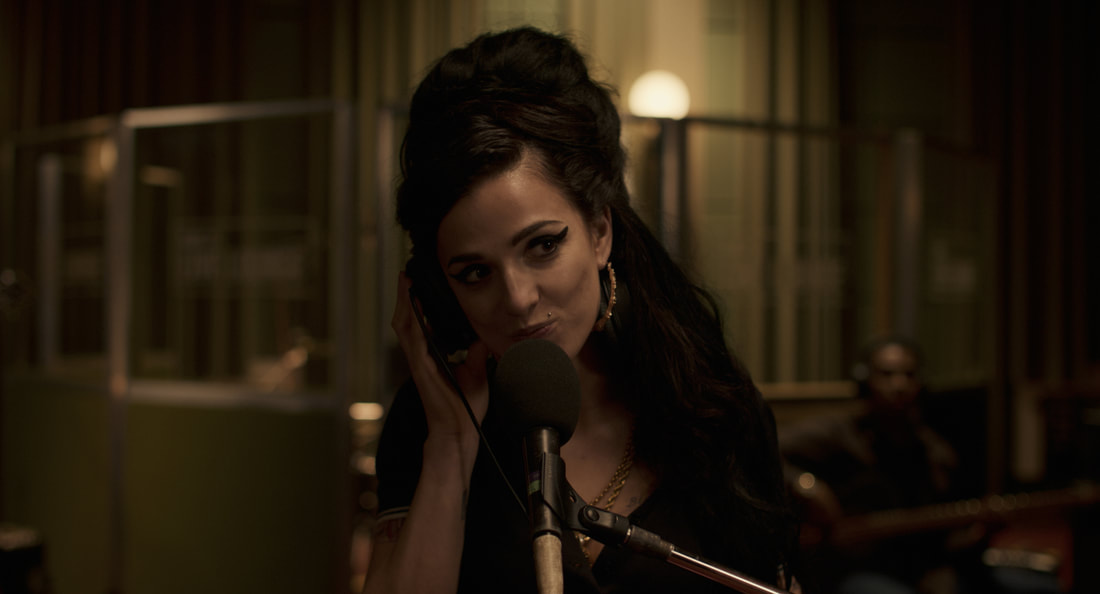|
Review by Joseph Fayed Amy Winehouse lived quite the life for someone who died at only 27 years old. The media would act like she was plagued by fame and drugs and that's how she met her untimely demise. Back to Black, a Winehouse estate-approved biopic, puts the blame on sex, drugs, and jazz for the troubled starlet's demise. It is a very safe approach to the dangers of addiction at the expense of a joyful life and a story that beats around the bush about how Amy may have been failed. The film begins with 18-year-old Amy Winehouse (Marisa Abela) sharing her love for singing with her father, Mitch, and her grandmother, Cynthia. Soon after, a friend introduces her to her first manager at Island Records who immediately sees her talent. She releases her first album, "Frank," to rave reviews. Her fame grows, and despite warnings from her label to change her act, Amy remains defiant in being who she is. She meets Blake Fielder-Civil (Jack O'Connell) and quickly falls in love. Blake's demons, along with Amy's, begin to clash. The world admires her soulful voice, but concerns grow for Amy's lifestyle. Amy insists that nothing is wrong, but several occurrences of alarming behavior scare those around her as she prepares to record her second and most acclaimed album yet. The biopic comes across as a new iteration of A Star Is Born but the main difference here is combing key characteristics of the male and female leads of those film into one person: Amy. Amy's troubles appear to be the direct result of the environment in which she was engulfed. Fame is troubling, and no one craves it — any celebrity of a certain status will tell you that. That lesson bears no repeating as many times as it does in this film. One thing the film does insist on is that Amy's family relationships didn't seem to suffer as a direct result of her fame, but rather because of her relationship with Blake. This is where, narratively, Amy's story becomes a bit confusing. It leaves the viewer asking whether fame kills. Or is it a bad boy who will cause you to self-destruct? Ultimately, it is a mix of both, but the message gets lost in translation. While Amy's rise to fame is heavily explored, her artistry goes on the back burner. While the events that loosely influenced some of her hit songs are retold, it is more of a clunky cumulation than Amy reflecting upon her life. It works when it retells how her breakups inspired several songs but goes off track when it comes to her addiction and self-control. Such a personalized experience is presented as a nightmare by the press and, to a lesser extent, her parents. If the lyrics to "Rehab" are true, are we supposed to believe Amy thought her struggles with addiction were just projected onto her by select people she knew?
Marisa Abela gives it her best as Amy. She really looks and acts like Amy during the scenes when she is performing on stage. Her lip-syncing and mannerisms are the most impressive. Her speaking voice is a bit quieter than the real Amy's was, and with her styling, it sounds a bit like a British woman dressed in a costume like Amy. That observation aside, it is Abela who brings depth and sincerity to her role. Jack O'Connell has good chemistry with Abela and is surprisingly convincing as the enabler of Amy's pain. Blake is misunderstood by everyone except Amy, and his own sufferings are paired perfectly on screen by O'Connell and Abela. Back to Black is the first attempt by Hollywood at an Amy Winehouse biopic, and while it has a good run, it tends to fall into its own cliches. Amy repeatedly says she doesn't sing to be famous, but this film mostly observes how famous people suffer in the public eye, emphasizing them and their struggles being so well known. It seems the Winehouse estate feared judgment for how Amy was treated; the best comparison would be putting a Band-Aid on an old wound. Sam Taylor-Johnson's direction and Matt Greenhalgh's script make fame out to be the biggest monster in Amy's life. She clearly had her own inner demons and so did those who knew her the best. Perhaps fame and drugs are more of a correlation, not causation, with troubled singers, but if that's not what sells albums and movie tickets, then maybe Hollywood won't consider a different approach to its art. Back to Black hits theaters on May 19. Rating: 3/5
0 Comments
Leave a Reply. |
Archives
July 2024
Authors
All
|
|
|
disappointment media
Dedicated to unique and diverse perspectives on cinema! |


